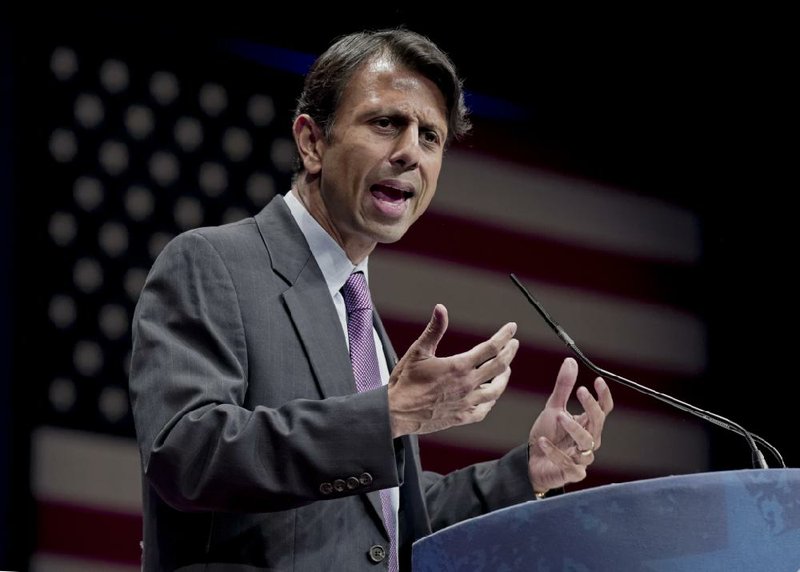Louisiana Gov. Bobby Jindal sued the U.S. Department of Education, claiming it's unconstitutionally coercing states into adopting national curriculum standards for elementary and secondary education.
The federal government has "hijacked" the Common Core initiative, a set of academic measures in math and English, forcing states to adopt its preferred tests or put billions of dollars at risk, Jindal said Wednesday in a statement. A complaint was filed in federal court in Baton Rouge.
"Common Core is the latest effort by big government disciples to strip away state rights and put Washington, D.C., in control of everything," he said.
The Common Core State Standards Initiative was developed in response to concerns about U.S. academic performance and competitiveness with other countries. The standards have been adopted by more than 40 states and the District of Columbia.
States that adopt the standards qualify for grants from President Barack Obama's $4.35 billion Race to the Top program. States also can waive accountability requirements of the No Child Left Behind Act of 2001 in exchange for adopting Common Core.
Critics argue the program amounts to a federal takeover of education, prompting some states to halt or delay implementation.
Indiana, Oklahoma, South Carolina, Texas, Nebraska and Virginia are among the states that rejected it, some after joining. Missouri and North Carolina joined but are re-examining the standards with the goal of improving or replacing them.
Common Core supporters accused Jindal of playing politics in court Wednesday.
"This certainly looks like a frivolous lawsuit that's geared more toward publicity than substance," said Barry Erwin, president of the Council for A Better Louisiana, a nonpartisan organization that has previously worked with Jindal on his education policy initiatives.
But praise quickly poured in for the legal challenge from conservative groups.
"Gov. Jindal is defending the liberties of citizens and the constitutional structure intended to protect those liberties," Emmett McGroarty, education director of the Washington-based American Principles Project, said in a statement.
The complaint follows a Louisiana state court judge's rejection of the governor's attempt to delay the state's participation through executive action.
Judge Todd Hernandez in Baton Rouge granted the request of a New Orleans charter school group and the state Board of Elementary and Secondary Education to temporarily disallow Jindal's suspension of a testing contract between the board and a consortium of states associated with Common Core, the Times-Picayune reported Aug. 19.
Kyle Plotkin, Jindal's chief of staff, said in a statement that day that the governor would appeal.
Louisiana's education department defended its use of the standards Wednesday.
"The Common Core State Standards have been fundamental expectations in Louisiana for four years because our kids are just as smart and capable as any in America. The courts have ruled, and it is time to move on," state education department spokesman Barry Landry said in a statement.
But Jindal is arguing in the complaint filed Wednesday that the standards initiative is an attempt by the federal government to implement national education changes beyond the intentions of Congress.
Common Core violates the 10th Amendment to the U.S. Constitution, which reserves to the states powers not specifically granted to the U.S. and thus limits the role of the federal government in education policy, according to the complaint.
Louisiana's suit has little chance of success but may add to the increasingly critical views of Common Core, said Neal McCluskey, associate director of the Cato Institute, a Washington organization that works for "individual liberty, free markets and constitutionally limited government," according to its website.
"Polls have shown that you've gone from people not knowing what Common Core is to knowing and disapproving," McCluskey said.
Courts tend to uphold the federal government when it encourages states with money while lacking specific constitutional authority, he said.
Coercion would be difficult to prove given "there is enough wiggle room where it's not 100 percent clear that the federal government is dictating particular standards," McCluskey said. "The reality is they're dictating standards."
Jindal is seeking a court order barring the Department of Education from penalizing states that refuse to participate in the initiative from receiving federal dollars.
Information for this article was contributed by Sophia Pearson and Michael McDonald of Bloomberg News and by Melinda Deslatte of The Associated Press.
A Section on 08/28/2014
